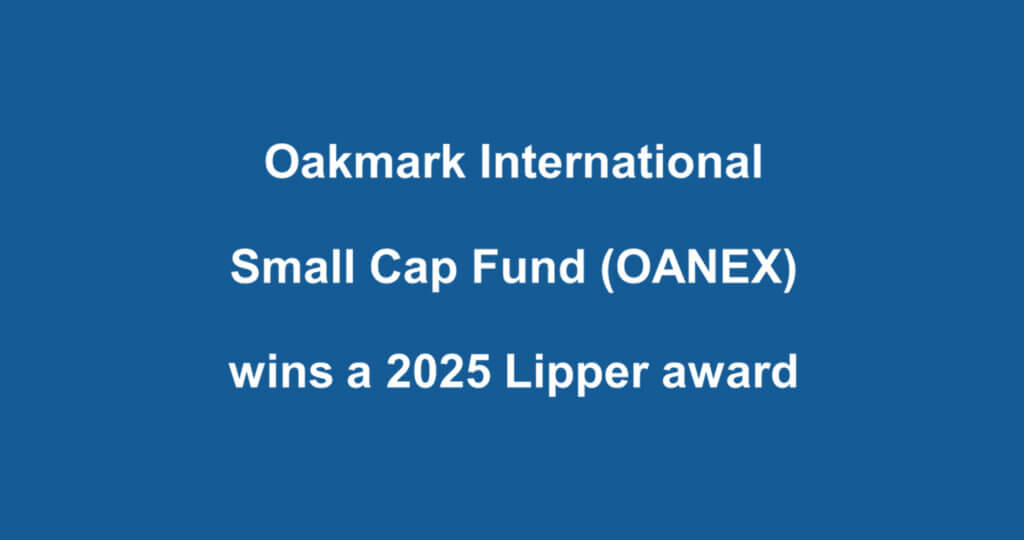Oakmark International Small Cap Fund - Investor Class
Average Annual Total Returns 12/31/13
Since Inception 11/01/95 10.86%
10-year 10.44%
5-year 20.78%
1-year 27.68%
3-month 3.24%
Gross Expense Ratio as of 09/30/13 was 1.35%
Past performance is no guarantee of future results. The performance data quoted represents past performance. Current performance may be lower or higher than the performance data quoted. The investment return and principal value vary so that an investor’s shares when redeemed may be worth more or less than the original cost. The performance of the Fund does not reflect the 2% redemption fee imposed on shares redeemed within 90 days of purchase. To obtain the most recent month-end performance data, view it here.
The Oakmark International Small Cap Fund returned 3% for the quarter, compared to 6% for the MSCI World ex U.S. Small Cap Index. The Fund performed well in both absolute and relative terms for the one-year period ending December 31, 2013, with the Fund returning 28% and the MSCI World ex U.S. Small Cap Index returning 26%.
The top contributing stock for the quarter was Saft Groupe. The company has two main divisions: the Specialty Battery Group (SBG), which makes lithium batteries for various end markets including satellites, utility meters and military applications; and the Industrial Battery Group (IBG), which produces rechargeable nickel and lithium-ion batteries for industrial back-up power, aviation, rail, telecom and energy storage industries.
Saft released its third quarter revenue results during October, which showed continued strong growth within IBG and signs of stabilization in SBG. Revenues in IBG advanced just over 15% from the nine-month year-ago period. This performance was driven by increased demand in the telecom sector, strong demand for industrial stand-by batteries in the Middle East and a stabilization of the energy storage business. Revenue trends at SBG remain challenging, down about 5% over the past nine months, but third quarter revenues improved over the first half of 2013 due to growth in civil electronics and space, as well as stabilization of the military sector.
LSL Property Services ended the year as the Fund’s largest contributing stock. Last quarter we discussed how LSL was reaping the benefits from a recovery in the U.K. residential housing market, partly as a result of government stimulus programs. During the fourth quarter the U.K. government announced a cutback in its Funding for Lending scheme, but this should not impact the Help to Buy initiative, which targets the residential housing market and therefore supports LSL’s primary business. Residential housing transactions have already begun to rebound in the U.K. and increased at double-digit levels in 2013. We expect this momentum will continue into 2014 and beyond. Even with the recent increases in housing transactions, the U.K. residential market still remains depressed versus historical norms. LSL should benefit from a continued recovery.
The largest detractor from the Fund’s performance for the past quarter – and one of the largest detractors in the calendar year – was a holding just added in June: CGG, an operator and provider of seismic acquisition and data processing. As a seismic company, CGG relies directly on oil and gas companies’ investments. During the second half of 2013, in an environment with flat oil prices and continuing inflation across the supply chain, several oil and gas companies decided to further postpone their investments and wait until the economy improves to sanction new projects. Positioned at the beginning of the supply chain, CGG has been hurt by the cancellation of several projects, as well as lower-than-expected price increases. As a result, management smartly decided to launch a three-year plan to downsize CGG’s fleet in order to lower fixed costs and to focus on the most profitable segments. Despite these conditions, we think our investment case remains valid. With the end of “easy oil,” we believe that this offshore seismic company still offers an attractive investment opportunity.
Portfolio Activity
During the quarter, we sold Azimut Holdings and Taiyo Holdings, and we added two new names, Oracle Japan and MTU Aero Engines. Oracle Japan is the Japanese subsidiary of U.S.-based Oracle and has been in operation since 1985. The subsidiary provides many of the same services as its parent organization: database management, enterprise resource planning, supply chain management, data warehousing, customer relationship management and business intelligence. MTU Aero Engines, a German aircraft engine manufacturer, engages in the development, manufacturing, marketing and support of commercial and military aircraft engines. MTU has positions on a number of aircraft engines produced by GE and Pratt Whitney that have attractive long-term secular growth prospects.
Geographically we ended the quarter with 21% of our holdings in Asia, 63% in Europe and 11% in Australasia. The remaining positions are in North America, Latin America and the Middle East.
Because we continue to believe that some global currencies are over-valued, we maintained hedge positions on four currency exposures. At the recent quarter end, we had hedged 31% of the Fund’s Australian dollar, 48% of the Norwegian krone, 34% of the Swiss franc and 29% of the Swedish krona exposures.
We thank you for your continued confidence and support and wish all of you a very happy and healthy 2014!
As of 12/31/13, Saft Groupe SA represented 1.8%, LSL Property Services PLC 2.2%, Compagnie Générale de Géophysique Veritas (CGG) SA 2.0%, Azimut Holding SPA 0%, Taiyo Holdings Co., Ltd. 0%, Oracle Corp. Japan 0.5%, and MTU Aero Engines AG 1.5% of the Oakmark International Small Cap Fund’s total net assets. Portfolio holdings are subject to change without notice and are not intended as recommendations of individual stocks.
Click here to access the full list of holdings for The Oakmark International Small Cap Fund as of the most recent quarter-end.
The MSCI World ex U.S. Small Cap Index (Net) is a free float-adjusted market capitalization index that is designed to measure global developed market equity performance, excluding the U.S. The MSCI Small Cap Indices target 40% of the eligible Small Cap universe within each industry group, within each country. MSCI defines the Small Cap universe as all listed securities that have a market capitalization in the range of USD200-1,500 million. This benchmark calculates reinvested dividends net of withholding taxes using Luxembourg tax rates. This index is unmanaged and investors cannot invest directly in this index.
The stocks of smaller companies often involve more risk than the stocks of larger companies. Stocks of small companies tend to be more volatile and have a smaller public market than stocks of larger companies. Small companies may have a shorter history of operations than larger companies, may not have as great an ability to raise additional capital and may have a less diversified product line, making them more susceptible to market pressure.
The percentages of hedge exposure for each foreign currency are calculated by dividing the market value of all same-currency forward contracts by the market value of the underlying equity exposure to that currency.
Investing in foreign securities presents risks that in some ways may be greater than U.S. investments. Those risks include: currency fluctuation; different regulation, accounting standards, trading practices and levels of available information; generally higher transaction costs; and political risks.
The discussion of the Fund’s investments and investment strategy (including current investment themes, the portfolio managers’ research and investment process, and portfolio characteristics) represents the Fund’s investments and the views of the portfolio managers and Harris Associates L.P., the Fund’s investment adviser, at the time of this letter, and are subject to change without notice.







